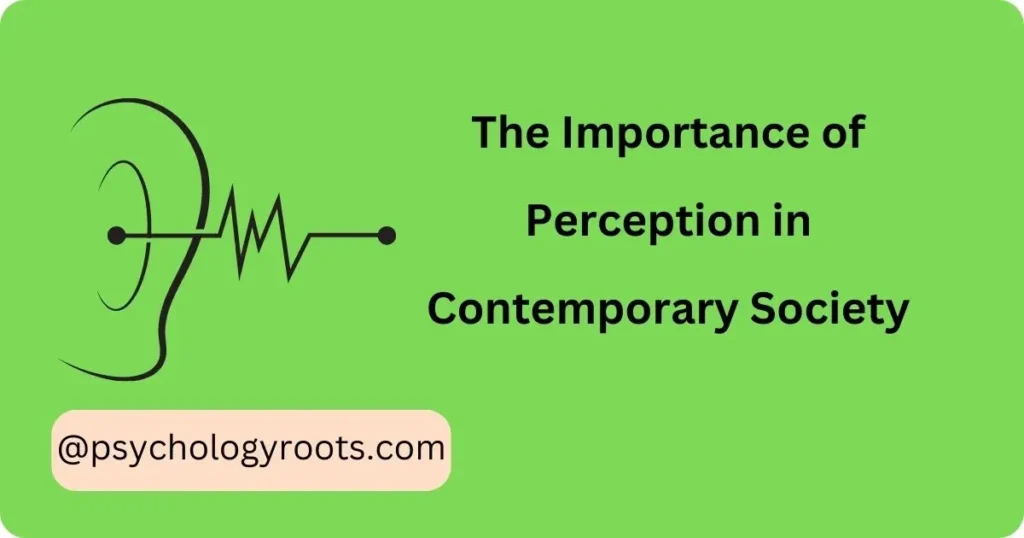Table of Contents
The Importance of Perception in Contemporary Society
Here in this post, we are discussing “The Importance of Perception in Contemporary Society”. You can read more about psychology-related material on our website. Keep visiting Psychology Roots.
Table of Contents
In the present-day world, perception plays a crucial role in shaping our comprehension of the surrounding environment and influencing our interactions with fellow individuals. The manner in which we perceive people, events, and ideas holds profound consequences, impacting not only our personal lives but also our professional pursuits and the broader socio-political landscape. This article delves into the intricate nature of perception and explores its significance across various facets of human existence.

Perception’s Impact on Relationships
Perception, often likened to a lens through which reality is viewed, exerts a profound influence on our relationships with others. Initial impressions that we form about individuals are heavily swayed by our perceptions, which can be shaped by factors such as appearance, behavior, or cultural biases. These perceptions subsequently mold our attitudes, judgments, and subsequent interactions, ultimately influencing the trajectory of our relationships. It is crucial to acknowledge the subjective nature of perception and maintain an open-minded approach to prevent the formation of biased or unjust conclusions about others.
Perception and Professional Success
Furthermore, perception plays a pivotal role in the realm of professional success. Within the context of the workplace, the way we perceive our colleagues, superiors, and subordinates significantly impacts our career trajectory. Positive perceptions regarding our capabilities, skills, and work ethic heighten the likelihood of receiving promotions, recognition, and growth opportunities. Conversely, negative perceptions can impede our progress and curtail professional prospects. Cultivating positive perceptions necessitates not only competence in our respective fields but also effective communication, teamwork, and the ability to forge robust professional relationships.
Perception and Social Engagement
Moreover, perception profoundly affects our comprehension of intricate social issues and our involvement in civic life. The manner in which we perceive societal problems, such as poverty, inequality, or climate change, shapes our attitudes towards them and drives our commitment to taking action. Furthermore, perception molds our political ideologies and voting behavior, as we frequently align ourselves with candidates or parties based on our perceptions of their policies, values, and leadership qualities. Recognizing the impact of perception on these pivotal areas can inspire us to seek diverse perspectives, critically evaluate information, and engage in constructive dialogue to foster a more inclusive and well-informed society.
Media Influence on Perception
In the era of rapid information dissemination, the media assumes a central role in shaping public perception. The portrayal of events, individuals, and ideas in the media significantly influences how they are perceived by the masses. Media bias, whether intentional or unintentional, can sway public opinion and shape narratives that impact public discourse and decision-making. As responsible consumers of information, it is crucial for us to critically analyze media messages, seek multiple sources, and develop a discerning perspective to avoid being unduly influenced by biased portrayals.
In conclusion, perception wields immense power in shaping our experiences and the world we inhabit. It affects our relationships, professional endeavors, social engagement, and even our understanding of reality. By cultivating a conscious awareness of our own perceptions and embracing empathy, open-mindedness, and critical thinking, we can navigate the complexities of perception more effectively. Only then can we strive towards a society where perceptions are grounded in fairness, inclusivity, and a genuine desire to comprehend others.
Help Us Improve This Article
Have you discovered an inaccuracy? We put out great effort to give accurate and scientifically trustworthy information to our readers. Please notify us if you discover any typographical or grammatical errors.
Make a comment. We acknowledge and appreciate your efforts.
If you have any scale or any material related to psychology kindly share it with us at psychologyroots@gmail.com. We help others on behalf of you.